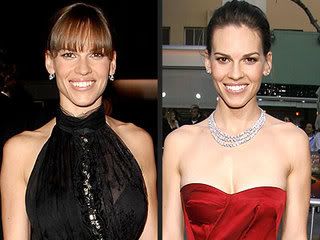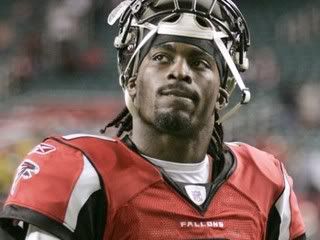In the first Football Fridays, I mentioned that it's a rare thing for people or animals to be killed as a result of anything having to do with football. There was new news this week about one of the more famous exceptions to this: superstar quarterback Michael Vick. Vick was convicted a couple years ago of having run a dogfighting ring for several years, after having lied to both NFL and law enforcement officials about being involved with it. (I won't go into a long diatribe against dogfighting, but it is a despicable practice that has results like this.) He is about to finish up an 18-month stint in prison during what would have been the prime years of his career in the NFL, and his return to the football field is eagerly anticipated by many people who love to see football played well.
The more recent controversy involves PETA's reaction to the possibility of Vick's return. PETA had approached the athlete about the possibility of doing a public service announcement about how dogfighting in particular, and cruelty to animals in general, are wrong and not something people should do. Vick and/or his representatives were interested in having PETA's support for his return to football, and the public service announcement seemed like a good trade for that support. However, PETA first wanted Vick to submit to a psychiatric evaluation which included a brain scan. He was unwilling to do this, and PETA withdrew their request for him to appear in a PSA.
After digging around through various articles, trying to make some sense of why this all was such a big deal, I found a really good discussion on this podcast from the Michael Irvin show. The first few minutes are mostly Irvin's co-host sputtering with outrage at PETA's presumption--what Alan Alda referred to, in his latest book, as "doing a Thomashevsky." The actual informative discussion starts at about 7:35. Basically, PETA was worried about the possibility that Vick perhaps doesn't regret anything, isn't sorry, and might possibly (though hopefully
 not) get caught dogfighting again in the future. If he recorded a public service announcement that said "Don't get involved in dogfighting, kids at home!" and then went out and did it again, the effect on the kids at home would be the complete opposite of what it was supposed to have been.
not) get caught dogfighting again in the future. If he recorded a public service announcement that said "Don't get involved in dogfighting, kids at home!" and then went out and did it again, the effect on the kids at home would be the complete opposite of what it was supposed to have been.Now at first, the shock and dismay of football partisans I've read, watched and listened to on the subject confused me. Why was everyone getting so huffy and worked up about this? "He's been punished enough, leave him alone!" "Why is PETA beating a dead horse like this?" "You can't go after him forever because he made one mistake!" Sure, athletes who commit crimes routinely walk, get reduced sentences, have their reputations smoothed over afterwards by a sympathetic media. Characterizing several years of running a brutally violent gambling ring as "one mistake" is part and parcel of the same bias. The bias that, for example, kept Randy Moss out of jail after he drove (relatively slowly) into a traffic cop, and kept going for a couple blocks with her on the hood of his car. While smoking a blunt.
But then it occurred to me:
Football fans are upset because they feel they've been punished enough.
Vick's potential on the football field (so I am told) is truly awe-inspiring--and the fact that he was imprisoned for committing crimes deprived the football-watching public of access to his talents. Getting angry at the athlete for committing the crimes that got him sent to jail would be a big, whopping load of cognitive dissonance. If you idolize him for his talent, you can't hate him for choosing to act in a despicable way off the field. This is another example of how "love the sinner, hate the sin" is not usually something people can do in practice, which Worlds & Time discussed eloquently a week or so ago. So instead of getting angry with the beloved-because-talented athlete, they get angry with the people who persist in pointing out his non-football related flaws.
Yesterday Dave mentioned to me something he saw on ESPN's bottom line: that some of the dogs Vick had involved in the fighting were his own family's pets. I wasn't able to find any articles that mentioned this tibit, so I don't know where the information came from. But it got me to thinking about the sometimes enormous disconnect between the celebrity as object and the celebrity as human being. How are we supposed to wrap our minds around this?
Celebrities as objects serve an important function in society. They give us templates for behavior
 and appearance. They give us ways to discuss aspects of being human without having to refer to any of the individual human beings actually participating in the discussion. This week's episode of The Office, for example, had almost the entire cast of characters involved in an episode-long debate over the question: Is Hilary Swank hot or not? I loved the entire side of the episode centered on this debate, because it ran through all the stages that any argument will go through, online or in person. From people taking the results too personally, to people disagreeing on defining the original terms of the debate ("Would I make out with her?" is not the same question as "Is she hot?"), to people getting frustrated in the middle and declaring that "no one ever changes their mind, we all just get more firmly entrenched in the views we already had."
and appearance. They give us ways to discuss aspects of being human without having to refer to any of the individual human beings actually participating in the discussion. This week's episode of The Office, for example, had almost the entire cast of characters involved in an episode-long debate over the question: Is Hilary Swank hot or not? I loved the entire side of the episode centered on this debate, because it ran through all the stages that any argument will go through, online or in person. From people taking the results too personally, to people disagreeing on defining the original terms of the debate ("Would I make out with her?" is not the same question as "Is she hot?"), to people getting frustrated in the middle and declaring that "no one ever changes their mind, we all just get more firmly entrenched in the views we already had."At what point, as individuals who want to be socially responsible, do we have to separate the object from the person? When do we have to tear our minds away from Vick's incredible potential awesomeness on the football field and start thinking about him as a human being? An untouchable sports idol who indulges in dogfighting can feel, in your mind, like a light and not very serious thing when weighed against the great emotional force of a lifetime commitment to football fandom. You want to forget about it, to avoid the cognitive dissonance between the object you love and the person whose actions you can't condone. So you focus only on the object. But moved outside of that context, a real human being who would take his family pet and make it fight other dogs to the death--or, if it didn't die in the ring, electrocute or drown it for the audience's viewing pleasure--gets put way, way down on my shit list.
To provide some perspective, here's a Bill Simmons article about his family dog which recently died. That's what I would consider a normal American view on how one should think and feel about domesticated dogs. The "object" version of every public figure in America feels this way about dogs. TV shows, movies and most media-based role models try to teach the children of America to feel this way about dogs. This is admirable.
In the first Football Fridays, me and Dave both ended up changing our perspectives on the Titans. This happened because the real life person Jeff Fisher, their coach, is an unabashed supporter of Mercy Ministries, an organization that pretends to offer psychiatric care and professional counseling to young women but actually has untrained Bible students lead them in prayer and give them exorcisms. The undeniably talented Michael Vick actually mutilated dogs. Not in the facetious way, where you say to your friend, "oh, so-and-so's a bad guy; he like, kicks puppies." No. Actually did it. Actually mutilated dogs and killed them. For fun and profit. And is not sorry.
So the only reason I can think of that people would still defend him with such vehemence, still want to root for him, still have this entirely positive view of him, is that they have completely objectified him. There is no concept of a real human being attached to the words Michael Vick in these football partisans' minds. There is only the legend, the skill at football, the jersey, the name.
To me that is just as sad, just as stupid and ridiculous as objectifying nude models and porn stars. Yes, objectifying men and women who can or will do awe-inspiring things can make us feel good. No, I don't have a problem with the objectification process itself. It can serve useful functions--whether in social life, as in the debate mentioned above, or in personal life, as a way of more clearly visualizing an ideal of beauty or swiftness or joy. But when we cannot separate the ideal from the idol, the person from the thing that person represents, then the results can only be bad. Whether it's sexually harassing a waitress 'cause she's got a huge rack, or looking the other way when a famous guy hurts puppies.


2 comments:
Wow, powerful essay. Honestly, I am biased here though, because I don't think Vicks can be punished enough for what he did to those animals. I am disgusted he is going back to professional football. I won't watch any game where he is playing (OK, I don't watch much football anyway, but still...).
Regardless, I think you made some great points. People see everything as so black and white -- if they like someone (including someone they don't know, like a celeb or politician), he can't have done a bad thing, no matter what the facts are. And someone they dislike can't do a good thing.
This is why, for allegedly rational creatures with opposable thumbs, I think we're still a mess of a species.
Thank you! :) I'm glad you liked it, and took the time to comment as well. You really made my day.
But don't give up on humanity just yet! It's easy to get discouraged when we compare the way we are now to the ideals we strive for. But think how recently in human history, even American history, things worse than dogfighting were common practice, socially condoned. Bear-baiting. Drowning excess kittens. Or to up the ante, slavery, where human beings were sometimes treated worse than the animals abused in dogfighting!
So, take heart, Guin. As the old cigarette ads used to say: We've come a long way, baby.
Post a Comment